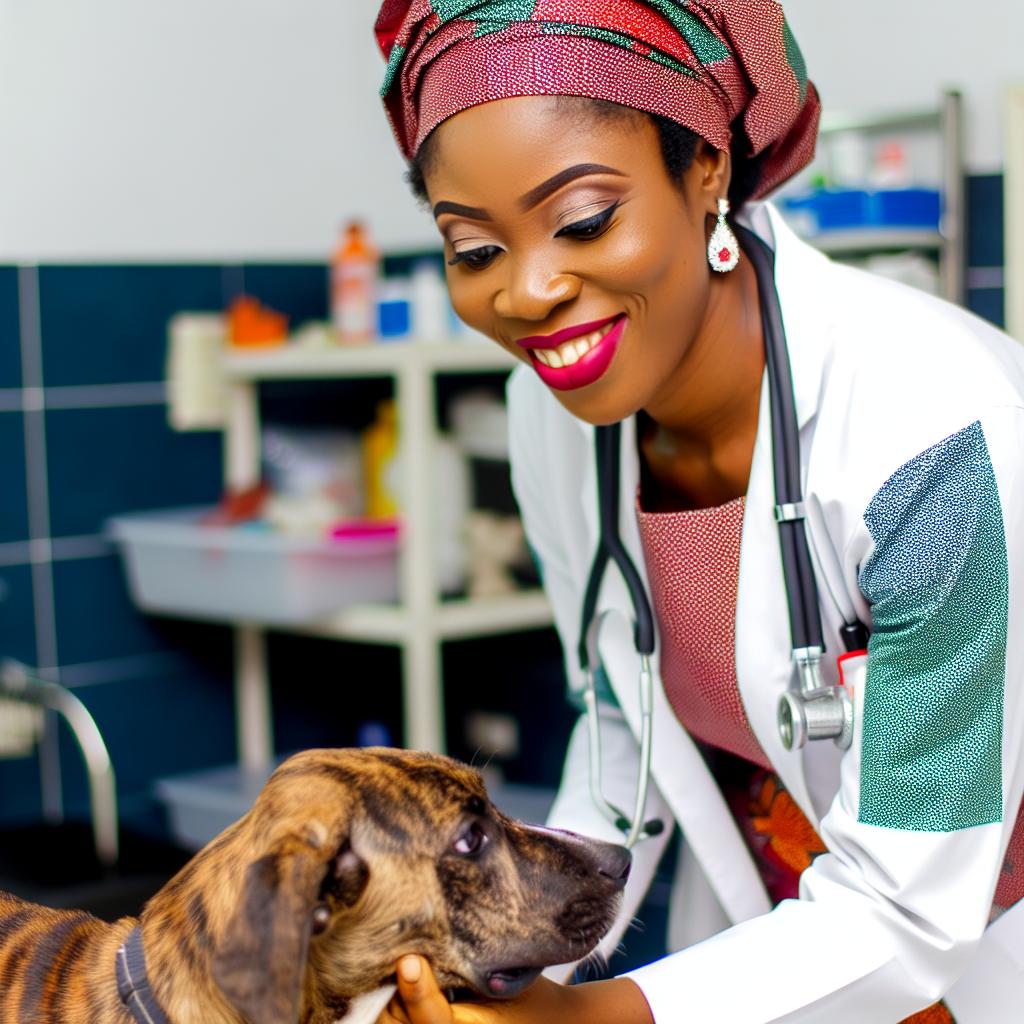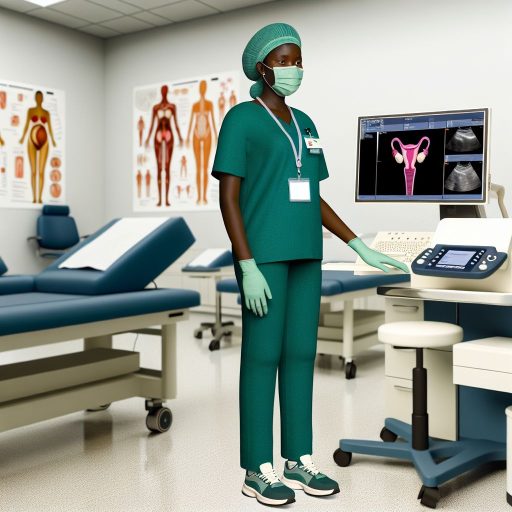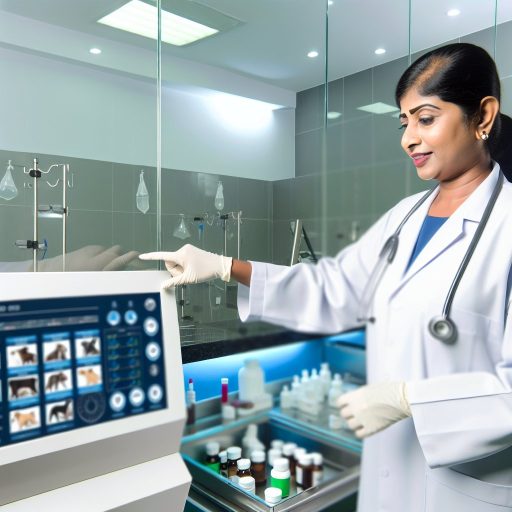Introduction
Veterinary medicine in Nigeria plays a crucial role in animal health, public health, and food security.
Specializations in this field are essential to cater to the diverse needs of animals and society.
The different specializations in veterinary medicine in Nigeria include public health, wildlife veterinary medicine, small animal medicine, large animal medicine, and laboratory animal medicine.
General Veterinary Medicine
When it comes to veterinary medicine in Nigeria, general practitioners play a crucial role in providing healthcare services for animals.
Overview of General Veterinary Practice in Nigeria
General veterinary practitioners in Nigeria are responsible for diagnosing and treating a wide range of health issues in animals.
These professionals work in various settings, including private clinics, government agencies, research institutions, and non-profit organizations.
General veterinarians collaborate with other professionals, such as veterinary technicians, to ensure animals receive proper care and treatment.
Duties and Responsibilities of a General Veterinarian
General veterinarians in Nigeria perform a range of duties, including conducting physical examinations, administering vaccinations, and prescribing medication.
They also perform surgeries, provide emergency care, and offer nutritional advice to ensure the well-being of animals.
General veterinarians are responsible for educating pet owners on proper animal care and welfare practices to prevent diseases and injuries.
Importance in Providing Basic Healthcare for Animals
General veterinarians play a critical role in promoting the health and welfare of animals in Nigeria.
They help prevent the spread of diseases, improve animal nutrition, and enhance the overall quality of life for pets and livestock.
By providing basic healthcare services, general veterinarians contribute to the conservation and protection of animal species in the country.
Diagnostic Imaging
In veterinary medicine, diagnostic imaging plays a vital role in identifying and diagnosing various health conditions in animals.
Role of diagnostic imaging in veterinary medicine
Diagnostic imaging helps veterinarians visualize internal structures of the animals without invasive procedures, enabling them to make accurate diagnoses.
Types of imaging techniques used in Nigeria
- X-rays: Commonly used to visualize bones, joints, and organs in animals.
- Ultrasound: Utilized to examine soft tissues, organs, and pregnancies in animals.
- CT scans: Provide detailed cross-sectional images of internal structures for more accurate diagnoses.
- MRI: Used to visualize soft tissues, spinal cord, and brain in animals for precise diagnosis.
Importance of accurate diagnoses for effective treatment
Accurate diagnoses obtained through diagnostic imaging are crucial for developing effective treatment plans for animals.
Without proper diagnosis, treatment may be ineffective or even harmful to the animal’s health.
Therefore, investing in diagnostic imaging services is essential for ensuring the well-being of animals in Nigeria.
Find Out More: Medical Rehabilitation Workshops and Seminars Nigeria
Surgery
Understanding the basics of surgical procedures in veterinary medicine is crucial for veterinarians.
Surgical procedures involve incisions, manipulations, suturing, and other techniques to treat various conditions.
Surgeons require specialized equipment such as scalpels, forceps, and surgical drapes for successful surgeries.
Operating rooms must be sterile to prevent infections and promote faster healing post-surgery.
Overview of surgical procedures in veterinary medicine
Surgeries are performed to treat injuries, diseases, and abnormalities in animals.
Common surgical procedures include spaying, neutering, tumor removal, and orthopedic surgeries.
Some surgeries may be minimally invasive, like laparoscopic surgeries, while others require open procedures.
Anesthesia is administered to animals before surgery to ensure they remain unconscious and pain-free during the procedure.
Specialized equipment and facilities required for surgeries
Surgical suites are equipped with anesthesia machines, monitoring devices, and surgical instruments.
Operating tables are designed to provide stability and comfort for animals during surgery.
Advanced surgical equipment like lasers and endoscopes are used for specialized procedures.
Veterinarians and support staff must be trained in using surgical equipment safely and effectively.
Importance of surgical expertise in treating complex cases
Surgical expertise is crucial for performing delicate procedures and achieving optimal outcomes.
Complex cases may require specialized surgical skills, such as neurosurgery or cardiac surgery.
Surgeons must have a thorough understanding of anatomy and physiology to navigate complexities during surgery.
Continuous training and education are essential for surgeons to stay updated on the latest surgical techniques.
Explore Further: Microbiological Research Centers in Nigeria
Epidemiology and Public Health
Veterinary medicine in Nigeria goes beyond treating sick animals.
It plays a crucial role in epidemiology and public health.
Let’s delve into the significance of these specializations.
The impact they have on society is substantial.
Transform Your Career with Expert Guidance
Get personalized mentorship consulting that’s tailored to your unique path. Our expert advice is actionable and exclusive.
Get StartedImportance of Epidemiology in Preventing Disease Outbreaks
Epidemiology is the study of the patterns, causes, and effects of health and disease conditions.
In veterinary medicine, epidemiologists play a crucial role.
They identify and control disease outbreaks in animal populations.
- Tracking disease trends: Epidemiologists monitor the incidence and prevalence of diseases.
- Identifying risk factors: They study factors contributing to the spread of diseases.
- Implementing control measures: They work closely with veterinarians to implement control measures.
Role of Veterinarians in Safeguarding Public Health
Veterinarians play a crucial role in safeguarding public health.
They prevent the transmission of zoonotic diseases from animals to humans.
Zoonotic diseases are infections transmitted between animals and people.
- Surveillance and monitoring: Veterinarians monitor disease outbreaks in animals.
- Educating the public: They educate stakeholders on hygiene and proper animal care.
- Collaboration with public health agencies: They work with agencies to develop strategies.
Examples of Public Health Initiatives in Nigeria Led by Veterinary Professionals
Veterinary professionals in Nigeria are involved in public health initiatives.
These initiatives safeguard the health of both animals and humans.
- Rabies vaccination campaigns: They organize vaccination campaigns to control rabies.
- Food safety programs: They work to ensure the safety of animal products.
- Zoonotic disease surveillance: They monitor zoonotic diseases and implement control measures.
Epidemiology and public health are vital specializations in veterinary medicine.
Understanding their importance leads to a healthier environment.
Both animals and humans benefit from this in Nigeria.
Discover More: History of Dental Therapy in Nigeria

Role of veterinarians in caring for exotic and wild animals
Veterinarians specializing in zoological medicine are responsible for the health and wellbeing of a wide variety of species.
This includes animals in zoos, wildlife sanctuaries, and conservation centers.
They are involved in the prevention, diagnosis, and treatment of illnesses and injuries in these animals.
Additionally, they manage their nutrition, behavior, and reproduction.
Veterinarians in this field often work closely with other professionals.
These include wildlife biologists, ecologists, and conservationists.
They collaborate to ensure the welfare of endangered species.
Challenges and opportunities in zoological medicine in Nigeria
One of the biggest challenges faced by veterinarians in zoological medicine in Nigeria is the lack of specialized training programs and resources.
Many veterinary schools in the country do not offer specific courses or practical training in zoological medicine.
This situation makes it difficult for aspiring professionals to acquire the necessary skills and knowledge.
However, there are opportunities for growth in this field.
The demand for skilled veterinarians to work with exotic and wild animals continues to rise.
With the increasing focus on wildlife conservation and eco-tourism in Nigeria, there is a growing need for experts in zoological medicine.
Significance of conservation efforts in preserving wildlife species
Conservation efforts are essential for safeguarding the future of wildlife species in Nigeria.
Many of these species are threatened by habitat loss, poaching, and climate change.
Veterinarians play a vital role in these efforts by providing medical care and support to endangered animals.
They also participate in research and educational programs to promote conservation awareness.
By working hand-in-hand with government agencies, non-profit organizations, and local communities, veterinarians contribute to the sustainable management and protection of Nigeria’s rich biodiversity.
Ultimately, the conservation of wildlife species is crucial for maintaining ecological balance.
It is also vital for the cultural and economic well-being of the country.
Explore Further: Effective Study Techniques for Nigerian Medical Students
Veterinary Specializations in Nigeria
Veterinary medicine in Nigeria offers a variety of specializations for professionals to pursue.
From small animal medicine to public health and epidemiology, there are numerous paths to choose from.
Recap of the Different Specializations
Specializations such as surgery, pathology, and wildlife medicine provide unique avenues for professionals to make an impact in animal health and welfare.
Diversity of Career Paths
Whether you are interested in research, academia, or clinical practice, there is a specialized area of veterinary medicine that can cater to your aspirations and goals.
Explore Specializations in Veterinary Medicine
For aspiring veterinary professionals in Nigeria, we encourage you to explore the various specializations available in the industry.
Take the time to discover your passion and carve out a fulfilling career path in veterinary medicine.
Additional Resources
1 A SHORT CURRICULUM VITAE OF BABALOBI O.O. (NIGERIA …
Surgery in Nigeria | Global Health | JAMA Surgery | JAMA Network




